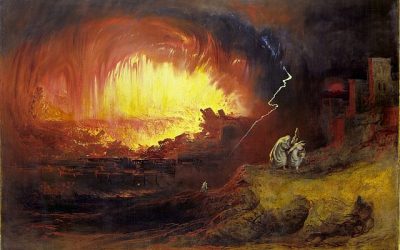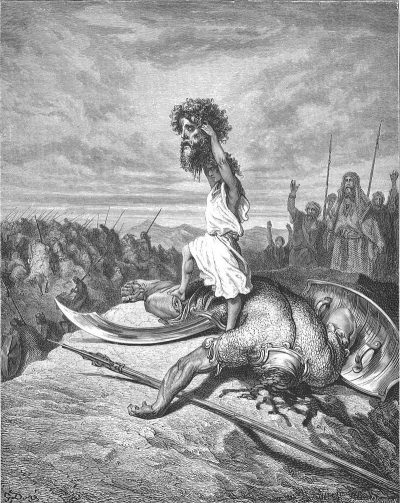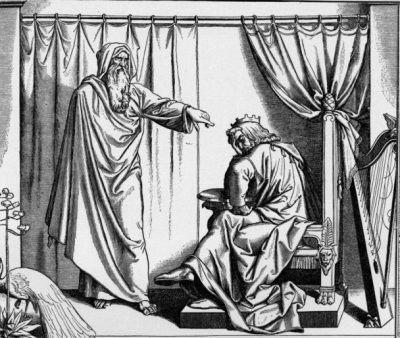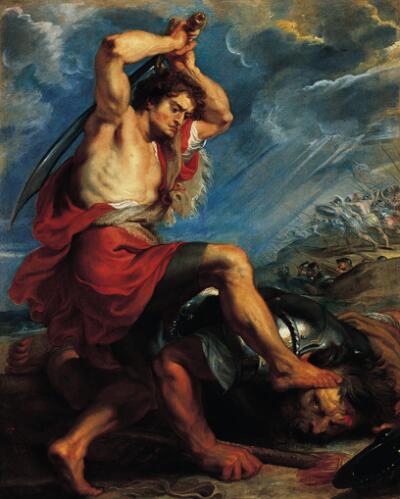
This blog marks the final one [YAY!] on the ASOR and SBL conferences in 2018.
Suppose a supernatural event occurs in historical time. By supernatural, I am referring to a natural but infrequent event that does not lend itself to daily, weekly, monthly, annual, or even Sothic cycles. These are events in historic time which are unique to the individuals experiencing them. Neither they nor anyone they know has ever experienced the event before. However similar events may have been remembered in the oral tradition from a long time ago.
A classic example would be the volcanic eruption of Mt. Vesuvius and the destruction of Pompeii. That event had an immediate impact on the people at that time. It also became part of the cultural legacy of the people. If a storyteller sets a story in Pompeii (or on the Titanic or in Atlantis), it is not too difficult to figure out that the ending will not go well for the people living there.
There were two such papers at ASOR both with biblical implications.
Environmental Archaeology of the Ancient Near East
“The 3.7kaBP Middle Ghor Event: Catastrophic Termination of a Bronze Age Civilization”
Phillip J. Silvia (Trinity Southwest University), A. Victor Adedeji (Elizabeth City State University), Ted E. Bunch (Northern Arizona University), T. David Burleigh (New Mexico Tech), Robert Hermes (Los Alamos National Laboratory), George Howard (Restoration Systems), Malcolm A. LeCompte (Comet Research Group), Charles Mooney (NC State University), E. Clay Swindel (Comet Research Group), Allen West (Comet Research Group), Tim Witwer (Comet Research Group), James H. Wittke (Northern Arizona University), Wendy S. Wolback (DePaul University), and Dale Batchelor (EAG Laboratories),
This paper surveys the multiple lines of evidence that collectively suggest a Tunguska-like, cosmic airburst event that obliterated civilization—including the Middle Bronze Age city-state anchored by Tall el-Hammam—in the Middle Ghor (the 25 km diameter circular plain immediately north of the Dead Sea) ca. 1700 B.C.E., or 3700 years before present (3.7kaBP). Analyses of samples taken over twelve seasons of the Tall el-Hammam Excavation Project have been and are being performed by a team of scientists from New Mexico Tech, Northern Arizona University, NC State University, Elizabeth City (NC) State University, DePaul University, Trinity Southwest University, the Comet Research Group, and Los Alamos National Laboratories, with remarkable results. Commensurate with these results are the archaeological data collected from across the entire occupational footprint (36 ha) of Tall el-Hammam, demonstrating a directionality pattern for the high-heat, explosive 3.7kaBP Middle Ghor Event that, in an instant, devastated approximately 500 km2 immediately north of the Dead Sea, not only wiping out 100% of the Middle Bronze Age cities and towns, but also stripping agricultural soils from once-fertile fields and covering the eastern Middle Ghor with a super-heated brine of Dead Sea anhydride salts pushed over the landscape by the Event’s frontal shockwaves. Based upon the archaeological evidence, it took at least 600 years to recover sufficiently from the soil destruction and contamination before civilization could again become established in the eastern Middle Ghor.
I am not qualified to discuss the science of this presentation which I did not see. What I do note is that it was of one two papers to garner some media attention. The other one was the session on changing the name of ASOR to delete the word “Oriental.” While I did download the papers from that session, so far I have not decided to write about it and instead am confining myself to archaeological and biblical papers.
The reason for the media attention for this presentation was due to a word not mentioned in the abstract and as far as I know not mentioned in the session. The word is “Sodom.” Here are some examples courtesy of Joseph Lauer.
Evidence of Sodom? Meteor blast cause of biblical destruction, say scientists
Bible’s Sodom and Gomorrah destroyed by an exploding asteroid, says archaeologists
Bible’s Sodom and Gomorrah destroyed by 10 MEGATON asteroid explosion, archaeologists say
Biblical City of Sodom Was Blasted to Smithereens by a Massive Asteroid Explosion
Scientists Admit Biblical Account of Sodom is Accurate.
According to Lauer, the ASOR presentation was not the first one on the subject. Silvia and Steven Collins presented the paper “The Civilization-Ending 3.7KYrBP Event: Archaeological Data, Sample Analyses, and Biblical Implications” to the Near East Archaeological Society in November 2015. The paper had been available at Silvia’s Academia page, This event is in accord with Collins view that Tall el-Hammam at the northern side of the Dead Sea is a strong candidate for the biblical city of Sodom.
The biblical implications of the cosmic event are not that it proves the Hebrew Bible is true. It is that the memory of the event survived for centuries and could be used by a biblical storyteller just as stories today can be set at Pompeii, on the Titanic, on in Atlantis. The application of the political template I have been using works for the original core story in Gen. 19 as well.
1. The story was composed as a standalone story. It was not yet part of a Lot or Abram cycle yet alone the Book of Genesis.
2. The author took for granted that the audience knew the legacy of the destruction of Sodom. As soon as the story was set there everyone knew what the ending would be.
3. The author took for granted that the audience knew what Israelite city the city of Sodom stood for in the political polemic or allegory (Gibeah).
4. The author took for granted that the audience knew who the weak king of the city was (Ishbaal).
5. The story was composed after the following event had occurred:
2 Samuel 3:7 Now Saul had a concubine, whose name was Rizpah, the daughter of Aiah; and Ishbosheth said to Abner, “Why have you gone in to my father’s concubine?” 8 Then Abner was very angry over the words of Ishbosheth, and said, “Am I a dog’s head of Judah? This day I keep showing loyalty to the house of Saul your father, to his brothers, and to his friends, and have not given you into the hand of David; and yet you charge me today with a fault concerning a woman. 9 God do so to Abner, and more also, if I do not accomplish for David what the LORD has sworn to him, 10 to transfer the kingdom from the house of Saul, and set up the throne of David over Israel and over Judah, from Dan to Beersheba.” 11 And Ishbosheth could not answer Abner another word, because he feared him.
This text had not yet been written but the breakdown in the social order implied by the text had already occurred. Ishbaal had become a figurehead king who had lost control of his military.
6. The author took for granted that the audience knew who the two messengers of Yahweh were (David and Joab).
In other words, according to this story, David offered amnesty or sanctuary to Ishbaal if he abandoned his capital city before it was destroyed. Ishbaal chose not to accept this offer. However Abner did abandon ship as he recognized that David was the superior warrior who could save Israel from the hand of the Philistines, but that’s another story.
The second cosmic story is my own presentation at ASOR.
“What Happened on October 30, 1207 B.C.E. in the Valley of Aijalon?”
Peter Feinman (Institute of History, Archaeology, and Education)
The suggestion has been made that on October 30, 1207 B.C.E. in the late afternoon in the Valley of Aijalon an annular eclipse occurred. The suggestion further has been made that this astronomical event is connected to the poem in the Book of Jashar recounted in Joshua 10. The astronomy and physics in the calculation of the annular eclipse are not the subject of this paper. Given the validity of those calculations, what historical reconstruction, if any, can be proposed that takes into account the relevant archaeological and biblical information including the Merneptah Stele, the Iron Age I hill-country settlements, Iron Age I geopolitics, the poem, and the narrative biblical texts?
I propose that the emergence of Israel as an anti-Egyptian entity generated a reaction among the Canaanite cities. Some cities shared Israel’s antipathy to Egyptian hegemony and welcomed the new entity while others were good vassals of Egypt and opposed the Canaanite cities and Israel that disrupted the Egyptian order. In other words, there is a story to be told of real-world power politics that has been lost amidst the cosmic imagery and the fight to determine whether the Bible is true. Applying the same techniques an American historian would use to understand the American Revolution may provide a more fruitful resolution of these issues.
The second cosmic story differs from the Sodom story in that Israelites, in particular Benjaminites, directly experienced it. The victory and cosmic sign became part of the Benjaminite tribal legacy, an alternative cosmic event to those of the Songs of Miriam and Deborah presumably part of the Book of the Wars of Yahweh controlled by the Levites.
What the paper only briefly alluded to is something frequently minimized in biblical scholarship: the precarious hold of Jerusalem as the capital city after the death of David. It is easy to overlook this situation if you think David and/or Solomon never existed or were at most chieftains. It also is easy to overlook if one’s focus is the temple. But it is important to realize that Jerusalem did not have a dominant position in the land of Canaan over either other Canaanite cities or Israel except for David. Then he died. So did presumably Jebusites Bathsheba and Zadok. Now what?
The questioning of the centrality of Jerusalem to Israel can be observed textually.
Jerusalem was not part of Israel:
Judges 19:10 and arrived opposite Jebus. He had with him a couple of saddled asses, and his concubine was with him. 11 When they were near Jebus, the day was far spent, and the servant said to his master, “Come now, let us turn aside to this city of the Jebusites, and spend the night in it.” 12 And his master said to him, “We will not turn aside into the city of foreigners, who do not belong to the people of Israel; but we will pass on to Gibeah.”
Jerusalem was an enemy of Israel:
Joshua 10:1 When Adonizedek king of Jerusalem heard how Joshua had taken Ai, and had utterly destroyed it, doing to Ai and its king as he had done to Jericho and its king, and how the inhabitants of Gibeon had made peace with Israel and were among them, 3 So Adonizedek king of Jerusalem sent to Hoham king of Hebron, to Piram king of Jarmuth, to Japhia king of Lachish, and to Debir king of Eglon, saying, 4 “Come up to me, and help me, and let us smite Gibeon; for it has made peace with Joshua and with the people of Israel.”
Bethel was a better cosmic center than Jerusalem:
Various supplements to the story of Jacob (Day 3 of the King David Bible).
By Persian times, the rivalry between Bethel and Jerusalem was déjà vue all over again.
To counter this opposition, Jerusalem relied on its old standby protector Egypt. Pharaoh’s daughter replaced Bathsheba as the dominant person in Solomon’s life. Pharaoh Solomon mimicked the ways of Egypt to the point of even building in the same locations Egypt had used to control the local populations. It is during the reign of Solomon when the rivalry among Zadokites, Aaronids, and Levites really heated up in the politics and in the stories.
The 11th-10th centuries BCE were quite active archaeologically, historically, and textually for the shifting Israelite people and polities. There still is a lot of work to do to historically reconstruct this period and to understand the formation of the Hebrew Bible. And with that thought, this review of the ASOR and SBL conferences in 2018 comes to an end.










